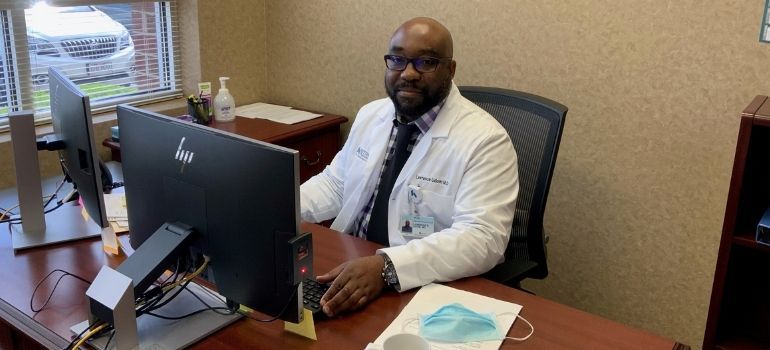Primary Care
Want to learn more about this at Kettering Health?
Living with a mental illness is more common in the U.S. than you may think. In fact, more than 1 in 5 U.S. adults live with a mental illness. And more than 1 in 5 teenagers, ages 13 to 18, currently or will wrestle with some form of disruptive, debilitating mental health issues.
Admitting you may need help can be scary, and finding a mental health professional can seem daunting. But you can start with someone you’re comfortable with—your primary care physician (PCP).
Dr. Lawrence Udom, a PCP with Kettering Health, explains how a PCP can help you talk through and understand your mental health concerns.
Talk with your PCP
Among their many areas of clinical expertise, PCPs are trained to treat mental health disorders such as depression, anxiety, and ADHD.
“I believe primary care providers are the ideal first step for anyone who believes they are experiencing mood symptoms,” says Dr. Udom. “We most likely know our patients best, and subsequently, know when they are acting outside their norm.”
Like any other visit, your doctor will begin by asking you questions to better understand your situation.
“A doctor will want to know what you are currently experiencing; what you have experienced in the past; and any family history of mental health,” says Dr. Udom. “Depending on the illness, you want to see how it affects day-to-day functioning, sleep, appetite, and other abilities.”
After gaining a better understanding, your PCP will outline a course of action.
“Your doctor will work with you to determine a diagnosis and develop an appropriate treatment plan,” says Dr. Udom, “which might include lifestyle changes, counseling, medications, referral to a specialist, or closer follow-up.”
When to seek help
While mental health issues are common, they aren’t something you have to go through alone. If your mental health affects your everyday life, talk to a provider.
Dr. Udom explains that common signs of mental health disorders include declining relationships, an inability to feel a full range of emotions, and failure to meet basic needs.
When you talk with your PCP, or any trusted expert about your mental health, it’s important to be honest. Being honest and vulnerable in a safe way allows them to provide you with the right care.
“Be honest and candid—this can help you get an accurate diagnosis and on the road to recovery,” Dr. Udom shares.









